
Victor John Angelo Raschi was an American Major League Baseball pitcher. Nicknamed "the Springfield Rifle", he was one of the top pitchers for the New York Yankees in the late 1940s and early 1950s, forming the "Big Three" of the Yankees' pitching staff. He also pitched for the St. Louis Cardinals and the Kansas City Athletics.

John August Antonelli was an American professional baseball player, a left-handed starting pitcher who played for the Boston / Milwaukee Braves, New York / San Francisco Giants, and Cleveland Indians between 1948 and 1961. Noted at the outset of his pro career as the recipient of the biggest bonus in baseball history when he signed with the Braves for $52,000 in 1948, he later became a six-time National League (NL) All-Star, a two-time 20-game-winner, and an important member of the 1954 World Series champion Giants' pitching staff. He batted left-handed, stood 6 feet 1 inch (1.85 m) tall and weighed 185 pounds (84 kg). He was the first person born in the 1930s to make his MLB debut.

Allan Fulton Worthington, nicknamed "Red", is a former professional baseball pitcher. He played all or part of 14 seasons in Major League Baseball for the New York / San Francisco Giants, Boston Red Sox (1960), Chicago White Sox (1960), Cincinnati Reds (1963–64) and Minnesota Twins (1965–69). Worthington batted and threw right-handed.

Clarence Nottingham "Chuck" Churn was an American professional baseball player. The native of Bridgetown, Virginia, was a relief pitcher in Major League Baseball who appeared in 25 games for the Pittsburgh Pirates, Cleveland Indians and Los Angeles Dodgers between 1957 and 1959. He threw and batted right-handed and was listed as 6 feet 3 inches (1.91 m) tall and 205 pounds (93 kg).

Salvatore Anthony Maglie was an American Major League Baseball pitcher and later, a scout and a pitching coach. He played from 1945 to 1958 for the New York Giants, Cleveland Indians, Brooklyn Dodgers, New York Yankees, and St. Louis Cardinals. Maglie was known as "Sal the Barber", because he gave close shaves—that is, pitched inside to hitters. A gentle personality off the field went unnoticed during games, his foreboding physical appearance contributing to his menacing presence on a pitcher's mound. He was the last of 14 players to play for the Giants, Dodgers and Yankees at a time when all three teams were in New York City. During a 10-year major league baseball career, Maglie compiled 119 wins, 862 strikeouts, and a 3.15 earned run average.

Michael Augustine Torrez is an American former Major League Baseball (MLB) starting pitcher. In an 18-season career, he pitched for the St. Louis Cardinals (1967–1971), Montreal Expos (1971–1974), Baltimore Orioles (1975), Oakland Athletics, New York Yankees (1977), Boston Red Sox (1978–1982), and New York Mets (1983–1984). As a member of the Yankees, he won two games of the 1977 World Series over the Los Angeles Dodgers. He batted and threw right-handed.

Myron Walter Drabowsky was an American professional baseball pitcher who played in Major League Baseball (MLB) for the Chicago Cubs, Milwaukee Braves, Cincinnati Reds, Kansas City Athletics, Baltimore Orioles, Kansas City Royals, St. Louis Cardinals, and Chicago White Sox. A noted practical joker, Drabowsky engaged in such antics as leaving snakes in teammates' lockers or phoning the opposing team's bullpen to tell a pitcher to warm up. He batted and threw right-handed.
Arthur Lee Guetterman, nicknamed "Goot," is an American former professional baseball pitcher who played from 1984 to 1996 for the Seattle Mariners, New York Yankees, New York Mets, and St. Louis Cardinals of Major League Baseball (MLB). A southpaw used primarily in the major leagues as a relief pitcher, he stood 6 feet 8 inches (2.03 m) tall. He led the Yankees in wins in 1990 without starting a game.

Santiago Casilla is a Dominican former professional baseball relief pitcher. He played in Major League Baseball (MLB) from 2004 to 2018 for the Oakland Athletics and San Francisco Giants. Casilla threw four pitches: a fastball, slider, curveball, and changeup.
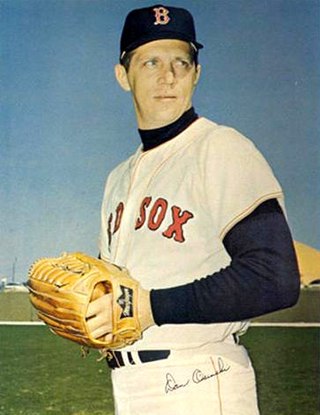
Daniel Osinski, nicknamed "The Silencer", was an American Major League Baseball relief pitcher. The 6 ft 2 in (1.88 m), 195 pounds (88 kg) right-hander was signed by the Cleveland Indians as an amateur free agent before the 1952 season. He played for the Kansas City Athletics (1962), Los Angeles Angels (1962–1964), Milwaukee Braves (1965), Boston Red Sox (1966–1967), Chicago White Sox (1969), and Houston Astros (1970).

Robert Lane Miller was an American professional baseball player. He played in Major League Baseball as a right-handed pitcher from 1957 to 1974. Miller played for three World Series champions: the 1963 Los Angeles Dodgers, 1965 Los Angeles Dodgers and the 1971 Pittsburgh Pirates—five league champions and four division winners, as well as for four teams that lost 100 or more games in a season.

Clarence Nottingham "Chuck" Churn was an American professional baseball player. The native of Bridgetown, Virginia, was a relief pitcher in Major League Baseball who appeared in 25 games for the Pittsburgh Pirates, Cleveland Indians and Los Angeles Dodgers between 1957 and 1959. He threw and batted right-handed and was listed as 6 feet 3 inches (1.91 m) tall and 205 pounds (93 kg).
William Henry McEnaney is an American former professional baseball player. He was a left-handed pitcher over parts of six seasons in Major League Baseball (1974–79) with the Cincinnati Reds, Montreal Expos, Pittsburgh Pirates and St. Louis Cardinals.
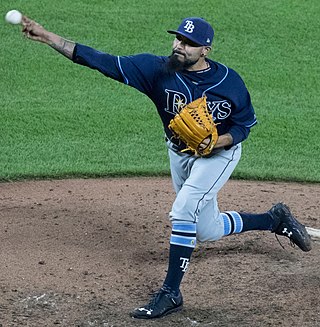
Sergio Francisco Romo is an American former professional baseball pitcher. He played in Major League Baseball (MLB) for the San Francisco Giants, Los Angeles Dodgers, Tampa Bay Rays, Miami Marlins, Minnesota Twins, Oakland Athletics, Seattle Mariners, and Toronto Blue Jays. A right-hander who served as a closer during his career, his main pitch was his slider.
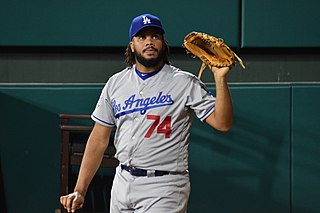
Kenley Geronimo Jansen is a Curaçaoan professional baseball pitcher who is a free agent. He has played in Major League Baseball (MLB) for the Los Angeles Dodgers, Atlanta Braves and Boston Red Sox.
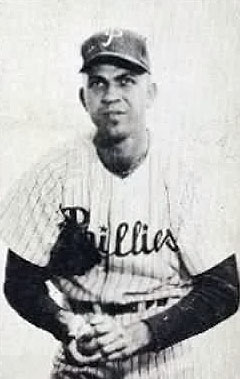
Andrew Viggo Hansen Jr., nicknamed "Swede", was a right-handed pitcher in Major League Baseball. In a nine-season career, he played for the New York Giants and the Philadelphia Phillies. Hansen was officially listed as standing 6 feet 3 inches (191 cm) and weighing 185 pounds (84 kg). He was nicknamed Swede despite being of Danish ancestry, according to The Sporting News' Baseball Register.
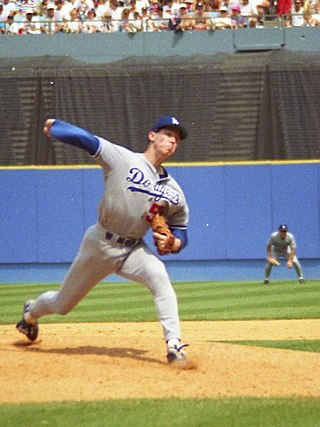
During the 1988 Major League Baseball season, pitcher Orel Hershiser of the Los Angeles Dodgers set the MLB record for consecutive scoreless innings pitched. Over 59 consecutive innings, opposing hitters did not score a run against Hershiser. During the streak, he averted numerous high-risk scoring situations. The streak spanned from the sixth inning of an August 30 game against the Montreal Expos to the 10th inning of a September 28 game against the San Diego Padres. The previous record of 58+2⁄3 innings was set by former Dodger pitcher Don Drysdale in 1968; as the team's radio announcer, Drysdale called Hershiser's streak as he pursued the new record. Pundits have described the streak as among the greatest records in baseball history, with one pundit ranking it among the greatest individual feats in American sports.

Héctor Neris is a Dominican professional baseball pitcher who is a free agent. He has played in Major League Baseball (MLB) for the Philadelphia Phillies, Houston Astros and Chicago Cubs. He signed with the Phillies as an international free agent in 2010, and made his MLB debut with them in 2014.

Nabil Antonio Crismatt Abuchaibe is a Colombian professional baseball pitcher in the Philadelphia Phillies organization. He has previously played in Major League Baseball (MLB) for the St. Louis Cardinals, San Diego Padres, Arizona Diamondbacks, and Los Angeles Dodgers.
The Call was a bad call made by umpire Don Denkinger in Game 6 of the 1985 World Series between the Kansas City Royals and St. Louis Cardinals on October 26, 1985 at Royals Stadium in Kansas City, Missouri. The Royals lost the first two games of the World Series at their home stadium and were on the verge of elimination, down 1–0 in the bottom of the ninth in Game 6, when Denkinger ruled Royals runner Jorge Orta safe at first. Television replays and photographs showed that Orta was out by half a step, and Denkinger received hateful letters and death threats from Cardinals fans following the game. The Royals went on to win the 1985 World Series.


















